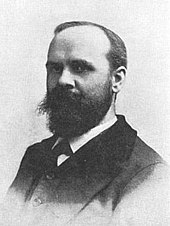Benjamin Tucker
Anarcoindividualista norteamericano (1854-1939)
(Redirigido desde «Ben Tucker»)
| Benjamin Tucker | |||||||||||
|---|---|---|---|---|---|---|---|---|---|---|---|
 |
|||||||||||
| Véase también | |||||||||||
| Esta página contiene citas de una persona fallecida hace 85 años. | |||||||||||
Benjamin Tucker (Dartmouth, Massachusetts, 17 de abril de 1854 - Mónaco, 22 de junio de 1939) fue un filósofo anarquista estadounidense del siglo XIX.
Citas
editar- «El anarquismo puede describirse como la doctrina de que todos los asuntos de los hombres deben ser administrados por individuos o asociaciones voluntarias, y que el Estado debe ser abolido».
[Anarchism may be described as the doctrine that all the affairs of men should be managed by individuals or voluntary associations, and that the State should be abolished].[1]
Textos políticos
editar- «No habría más que un artículo en la constitución de un país de Estado Socialista: "El derecho de la mayoría es absoluto". La afirmación de los socialistas de Estado, sin embargo, de que este derecho no sería ejercido en asuntos que atañen al individuo en las relaciones más íntimas y privadas de su vida no está confirmada por la historia de los gobiernos. Siempre ha sido la tendencia del poder a sumarse a sí mismo, a ampliar su esfera, a traspasar los límites que se le han fijado; y donde no se fomenta el hábito de resistir tal usurpación, y no se enseña al individuo a tener celos de sus derechos, la individualidad desaparece gradualmente y el gobierno o el Estado se convierte en el todo en todo. El control acompaña naturalmente a la responsabilidad. Bajo el sistema del Socialismo de Estado, por lo tanto, que responsabiliza a la comunidad por la salud, la riqueza y la sabiduría del individuo, es evidente que la comunidad, a través de su expresión mayoritaria, insistirá cada vez más en prescribir las condiciones de salud, riqueza y sabiduría, lo que perjudica y finalmente destruye la independencia individual y con ello todo sentido de responsabilidad individual».
[There would be but one article in the constitution of a State Socialistic country: "The right of the majority is absolute." The claim of the State Socialists, however, that this right would not be exercised in matters pertaining to the individual in the more intimate and private relations of his life is not borne out by the history of governments. It has ever been the tendency of power to add to itself, to enlarge its sphere, to encroach beyond the limits set for it; and where the habit of resisting such encroachment is not fostered, and the individual is not taught to be jealous of his rights, individuality gradually disappears and the government or State becomes the all-in-all. Control naturally accompanies responsibility. Under the system of State Socialism, therefore, which holds the community responsible for the health, wealth, and wisdom of the individual, it is evident that the community, through its majority expression, will insist more and more in prescribing the conditions of health, wealth, and wisdom, thus impairing and finally destroying individual independence and with it all sense of individual responsibility].</ref>Instead of a Book, Volumen 1972. Benjamin Ricketson Tucker. Edición reimpresa. Arno Press, 1893. ISBN 9780405004452. Página 8. </ref>
- «Supongamos que el Estado es un organismo, ¿Entonces qué? ¿Cuál es la inferencia? ¿Qué es el Estado permanente? Pero, ¿Qué es la historia sino un registro de la disolución de organismos y el nacimiento y crecimiento de otros para disolverse a su vez? ¿Está el Estado exento de este orden? Si es así, ¿Por qué? ¿Qué lo prueba? ¿El Estado es un organismo? Sí; también lo es un tigre. Pero a menos que lo encuentre cuando no tenga mi arma, su organismo se desorganizará rápidamente. El Estado es un tigre que busca devorar al pueblo y debe matarlo o paralizarlo. Su propia seguridad depende de ello».
[What of it? Suppose the State is an organism, - what then? What is the inference? That the State is therefore permanent? But what is history but a record of the dissolution of organisms and the birth and growth of others to be dissolved in turn? Is the State exempt from this order? If so, why? What proves it? The State an organism? Yes; so is a tiger. But unless I meet him when I haven't my gun, his organism will speedily disorganize. The State is a tiger seeking to devour the people, and they must either kill or cripple it. Their own safety depends upon it].[2]
Referencias
editar- ↑ Instead of a Book, by a Man Too Busy to Write One: A Fragmentary Exposition of Philosophical Anarchism. Benjamin Ricketson Tucker. Edición 2. B. R. Tucker, 1893. ISBN 9780598633903. Página 9.
- ↑ Instead of a Book, Volumen 1972. Benjamin Ricketson Tucker. Arno Press, 1893. ISBN 9780405004452. Página 33.
